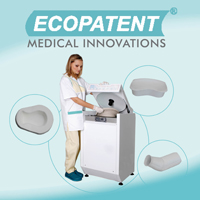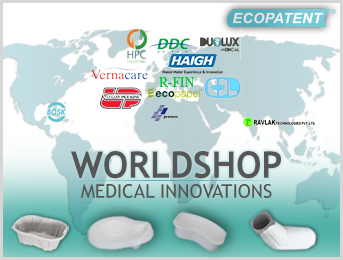Statement
Statement by Prof. Dr. med. Axel Kramer
about the ECOPATENT® System
The ECOPATENT® System is a hygienic and safe way to dispose of human excrement, making the reprocessing of urine bottles, bedpans, sputum cups and kidney bowls unnecessary.
In regard to ecological and economic aspects, this new way of disposing shows outstanding advantages over the disinfection with thermal disinfection equipment.
How can these results be achieved?
ECOPATENT® containers for excrement (as well as other containers) are produced from cellulose. After use the containers are disposed of with the ECOPATENT® ECO-Finischer – Macerator. They are shredded into small pieces, mixed with water, defibered, liquefied and disposed of through the sewage system like toilet paper.
Compared to the reprocessing of non-disposable containers in thermal disinfection equipment, disposal using the ECOPATENT® System can save up to 2/3 of water and disinfectants as well as up to 97 % of electricity.
The bedpans are stable enough to hold the body weight of a patient, two bedpans can be stacked into one another for patients with higher weight. Urine bottles come with measuring tapes that allow nurses to check the volume.
The lid of the ECOPATENT® ECO-Finischer – Macerator locks tightly so that no infectious aerosol can evaporate. Although sewage systems of hospitals show a surplus from the disposed cellulose, it is still below the average level of private home sewage systems.
At the same time, the work routine of the nursing staff becomes more efficient because containers don’t have to be returned for reprocessing. Furthermore, the validation and re-validation of the thermal disinfection equipment including inprocess checks every six months are unnecessary and result in additional economic and ecological advantages.
In addition, convenience for patients can be improved. Stainless steel bedpans and other basins are usually either too cold or given a short cooling-down period too hot. Cellulose containers are available as needed and take on the temperature of the storage room.
Conclusion:
The hygienic safety of disposed waste through the ECOPATENT® ECO-Finischer – Macerator is not subject to any technical disturbance variables, which cannot be completely eliminated for performance of thermal disinfection equipment despite complex revalidation and in-process monitoring. Because of its ecological advantages, reduced operating expenses and a more efficient work routine, the ECOPATENT® ECO-Finischer – Macerator is the best way to dispose of human waste in hospitals as well as nursing homes while promoting the idea of sustainability for future generations.





 Prof. Dr. med Axel Kramer, former President of the German Association for Hospital Hygiene and specialist for Hygiene and Environmental Medicine at Greifswald University
Prof. Dr. med Axel Kramer, former President of the German Association for Hospital Hygiene and specialist for Hygiene and Environmental Medicine at Greifswald University